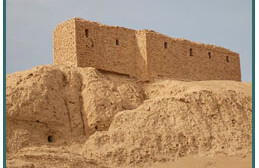One of the most memorable images in the days following the fall of Saddam Hussein was the sight of U.S. soldiers standing by as looters ransacked Baghdad's National Museum. Fortunately, the number of looted objects was far lower than initially feared. Some looters returned items after promises of rewards and amnesty, and many items previously reported missing turned out to have been hidden in the museum's secret storage vaults.
Yet even as the panic surrounding the museum subsided, another, even more tragic—albeit less sensational—story was unfolding. As journalist Micah Garen reported at a meeting of the Carnegie Council's Young Associates in May, large numbers of local and professional looters descended on antiquity sites across Iraq in the power vacuum created by the war, and were working on an "unprecedented scale." Henry Wright, leader of the first postwar survey of the country's antiquities beyond Baghdad, summed up the situation: "Far more material than what has been reported missing from the Iraq Museum in Baghdad is being ripped from the ground and leaving the country. Extraordinary damage is being wreaked on this irreplaceable archeological record."
Archeologists estimate that there are between 20,000 and 100,000 ancient sites in Iraq—most of them not yet excavated—ranging from simple mounds to the remains of ancient Mesopotamian cities such as Babylon, Ur, and Ninevah. The removal of artifacts from these sites could prove even more devastating than the loss of museum pieces, many of which have been catalogued and studied, making them easier to track down or identify once recovered.
One wonders why the United States failed to take greater precautions in Iraq, particularly given the country's archeological riches and their global significance. While the coalition forces deserve credit for sparing the archeological sites from bombing, to this day there has been ad hoc protection at best of these properties—by the Italian police, who are part of the coalition, and unarmed Iraqi guards—in contrast to the protection afforded to the nation's oil assets.
Clearly, a great deal is lost when looters inflict physical damage on ancient sites. As for the fate of the objects themselves, although in bygone eras it was considered safer for them to end up in Western museums, which practice proper conservation methods, today this is no longer considered a justification. No amount of conservation can alter a plundered item's status as an "orphan object," forever missing the clues to its historical context.
Loss of this information impoverishes us all, but it especially impoverishes the Iraqi people. Drawing on a sense of shared culture can help them to reconcile after years of division and hatred. As Koïchiro Matsuura, director of UNESCO, the UN's cultural arm, has said, "[I]f Iraq is to maximize its chances of reconciling past, present, and future, and take a decisive step towards reconstruction, it must treat culture as a matter of urgency, on equal footing with humanitarian aid, sanitation, and education." Stanching the loss of so much physical patrimony would help to set the stage for more ambitious reconciliation.
On January 24, 2005, independent journalist Micah Garen responded to Mary-Lea Cox's article as follows.
Watching from the Sidelines
Like most stories from Iraq, there is good news and bad news. The difficulty is always figuring out where the proportionality lies, towards the former or the latter. Until recently, there has been almost no good news regarding the ongoing looting of the archeological sites in southern Iraq. This fall, however, the State Board of Antiquities and Heritage finally began deploying its new mobile archeological guard force. In the heavily looted south there are now between 100-200 guards working with a half dozen trucks paid for by a $1 million grant from the Packard Foundation.
While this offers a glimmer of hope for protecting what little remains of the important Sumerian and Akkadian sites, it has been reported that the looters have moved from Dhi Qar province, where the guard force now patrols, into Qadissiya province just north of it, where they continue to ravage important sites such as Adab. The sheer number of archeological sites in Iraq, over 12,000 currently registered, fuels a significant misconception about the problem — that there is no easy solution to protecting them.
Yet in fact, while there are thousands of sites, there are less than twenty major Sumerian city-states. Since they are the richest and most important of the sites in the south, the looters have targeted these city-states en masse, in groups of more than two hundred strong at a time. If the financial resources were provided, protecting these Sumerian city-states would not be difficult. By comparison, the Coalition funded the establishment of an 800-strong guard force in Dhi Qar to protect the oil pipelines, which unlike the archeological sites, have been secure in that sector following the war. Hiring 400 civil guards to protect the archeological sites, which would have been more than sufficient, would have cost less than $500,000 a year.
Dr. Burhan Shaker, Director of Excavations for the Iraq State Board of Antiquities and Heritage, spoke about the problem in January at the annual Archeological Institute of America meeting held in Boston. While citing this important step forward, he again requested help to pay for salaries, trucks and communications equipment. The 2005 budget for the Iraq State Board of Antiquities and Heritage will be decided upon this month in Baghdad, so he will know within a few weeks what funding he will have to continue to try to safeguard world history.
With the worsening security situation and competing priorities, chances are that whatever funding is provided will not be sufficient for the task at hand.




